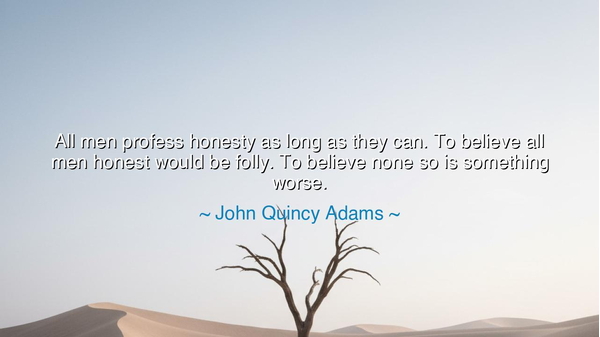
All men profess honesty as long as they can. To believe all men
All men profess honesty as long as they can. To believe all men honest would be folly. To believe none so is something worse.






Listen now to the wise words of John Quincy Adams, who understood the complexities of human nature and the delicate balance required to live in a world where trust and honesty often walk a fine line: “All men profess honesty as long as they can. To believe all men honest would be folly. To believe none so is something worse.” In these words, Adams speaks to the core of human interaction—the tension between trust and skepticism. He acknowledges the ideal of honesty that most people strive to uphold, but he also warns against the naivety of believing everyone is truly honest, and the danger of becoming so distrustful that we see dishonesty in all.
The ancients understood well the fragility of trust and the importance of honesty in society. Socrates, the great philosopher, spoke often of virtue, and how it could be found through understanding the nature of the self. But even he recognized the complexity of human character. The Greek philosophers warned that while it is essential to seek the truth and to live with integrity, it is equally important to recognize that people’s actions are often influenced by circumstances, desires, and personal weaknesses. To demand absolute honesty from others, Socrates might argue, is to misunderstand the human condition, which is imperfect and susceptible to error.
Consider the fable of the boy who cried wolf from ancient Greek mythology, a story told for generations to impart the importance of honesty and the consequences of deceit. The young shepherd boy, repeatedly crying out for help when no wolf was present, eventually found that no one believed him when the danger was real. This story serves as a powerful illustration of the relationship between trust and dishonesty. The boy’s dishonesty had consequences, and while it wasn’t a complete loss of faith in others, it revealed the damage that can occur when honesty is undermined over time. Similarly, John Quincy Adams warns that when dishonesty becomes too common, it erodes the very fabric of trust between individuals and society, creating an environment where no one can be trusted.
In contrast, the ancient Romans, particularly in the time of Cicero, emphasized the value of virtue and integrity in leadership. Cicero believed that the highest honor a person could achieve was to be known for their honesty and upright character. Yet, even in Cicero’s time, the Romans were no strangers to political intrigue, betrayal, and corruption. This paradox—the constant striving for virtue in a world of imperfection—echoes in Adams’ statement. It is a call to balance our expectations of honesty with the recognition that human nature is flawed. We must not hold to an unrealistic belief that all men are honest, nor must we retreat into a mindset where we see deceit in every action.
John Quincy Adams' words are a cautionary tale, reminding us that life is neither black nor white. To believe everyone is honest is to place ourselves in a position of vulnerability and possible betrayal, while to believe that no one is honest is to shut ourselves off from the connections and relationships that are essential to our existence. The balance lies in discernment—the ability to recognize the sincerity of others while being cautious of those who have shown themselves to be deceitful. Adams implores us not to discard honesty altogether but to engage with it critically, understanding that while people may fall short, they are also capable of integrity and truth.
Consider the example of Abraham Lincoln, whose own life was a testament to the idea that trust and honesty must be earned, but also extended to others, even in times of strife. During his presidency, Lincoln was surrounded by political rivals and potential deceitful acts, yet he was known for his honesty and his belief in reconciliation. His ability to trust others, even in times of great tension, allowed him to navigate the tumultuous waters of a divided nation. Yet Lincoln, like Adams, understood that trust must be built on integrity and that one must always be vigilant in distinguishing true honesty from falsehoods.
The lesson in Adams' words is one of wisdom and balance. It calls upon us to navigate the world with both hope and caution, extending trust to those who prove themselves worthy, while maintaining a healthy skepticism to protect ourselves from deceit. This discernment is the key to wisdom: the ability to see through the illusion of absolute perfection and to understand that honesty is not always a given. We must not allow the mistakes of others to make us distrustful of everyone, nor must we be blinded by the ideal of universal honesty that cannot exist in an imperfect world.
Therefore, I urge you, dear listener, to approach life with a sense of realism and balance. Extend your trust cautiously, and recognize that, like Socrates, the search for truth is a constant struggle between belief and doubt. In every relationship, whether personal or professional, strive for honesty and integrity, but do so with the understanding that not everyone will meet the high standards we set. Engage with others thoughtfully, recognizing the good in humanity, while protecting yourself from the betrayal that inevitably comes with misplaced trust. By maintaining this balance, you will cultivate both wisdom and resilience in a world that is neither wholly honest nor entirely deceitful.






AAdministratorAdministrator
Welcome, honored guests. Please leave a comment, we will respond soon